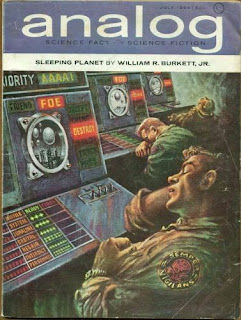William R. Burkett, Jr., turns 76 today. He isn't much remembered in SF this days, but his first novel, an Analog serial from the bedsheet days, is still remembered fondly in some circles. He was a journalist by main profession. He published two more SF books much later in 1998, Bloodsport and Blood Lines, books that the Science Fiction Encyclopedia describes as spoofish Space Opera about a big game hunter and his cyborg sidekick. In 2013, he self-published A Matter of Logistics 1, an expansion of a novella that John W. Campbell had rejected in 1968. (Campbell apparently had told him it needed to be expanded, and either Burkett didn't have time to do it then, or perhaps by the time he could take it further Campbell had died.) The second part of A Matter of Logistics hasn't appeared yet. Here's what I wrote about Sleeping Planet some while back:
 |
| (Cover by Kelly Freas) |
And what type is that? "Stupid Alien" stories. The sort of thing Russell did in Next of Kin, Wasp, Three to Conquer, "Nuisance Value", and other stories, and the sort of thing Anvil did in his Pandora stories. (Though to give Anvil his due, his "stupid aliens" weren't entirely cliche stupid aliens -- in some ways they really were superior to humans, and in fact they end up winning, though partly by letting the humans "join" them.) The basic idea is to either a) have aliens with what should be superior tech or numbers invade Earth, and be repulsed by human pluck or ingenuity; or b) have a few humans (or just one) be stuck on the alien planet and single-handedly outwit an entire planet of aliens. Sleeping Planet fits template a.
The story is told from three main viewpoints. James Rierson is a lawyer who is hunting in backwoods Georgia when strange things start to happen, beginning with the deer he is after just collapsing to sleep. Bradford Donovan is an ex-soldier, invalided due to his two artificial legs, who finds himself the only person who stays awake in an air-raid shelter after the alien Llarans attack. Martak Sarno is the Supreme Commander of the Llaran invasion fleet. It is Sarno who discovered the Llaran secret weapon, which he hopes will turn the tide in a decades long war. A plant on one of the Llaran colony planets secretes a poison which is harmless to Llarans but which puts Terran life to sleep, normally for just hours but Sarno's project has extended this period to months. The catch is that once exposed to this plant and put to sleep once, Terrans are immune to its effects. This means that a few humans who happen to have visited the Llaran planet in question and who encountered this plant are immune. Obviously, Rierson and Donovan are among those few.
Donovan is soon captured. But he soon gathers that Llarans are extremely superstitious, and he begins telling ghost stories and causing a loss of morale among the rank and file invaders. (This is a particularly Russell-like notion.) All this would come to nothing except that Rierson, who spends some time sniping at isolated Llaran units, overhears some of the soldiers repeating Donovan's stories, and cooperates by planting the idea that he is one of the ghosts Donovan mentions. Even that wouldn't have helped, except that Rierson eventually discovers the one group of fairly intelligent Earth inhabitants that are unaffected by the gas: robots. The story, then, involves the coordinated efforts of Rierson, Donovan, and the robots to continue to spread fear among the Llarans, finally bringing them to surrender.
I suppose it's a pleasant enough story, but it hardly seems worth special remembrance. It's second-rate imitation Russell, basically. It's not really even very funny -- which to be fair wasn't really Burkett's intention, in my view. Certainly the occasional atrocities committed by the aliens are hard to laugh at. It depends too much on implausibilities -- I suppose the first one, the unlikely effects of the "sleeping gas", are acceptable as the raison d'etre for the story, but the way the action plays out, and especially the convenient dullness of the aliens, just didn't convince me. Finally, there just wasn't enough cleverness. All the above shortcomings could have been overcome simply by a sufficient quantity of clever or silly or just plain adventurous happenings, but there really isn't enough here. A very minor work.
I well recall highly anticipating this one after reading JWC's enthusiastic comments in the June issue, but it fell flat, even for the callow teenager that I was then. Your fine review pretty much nails it. The best thing about it (indeed, the only really good thing) is Freas's cover, a minor classic in its own right.
ReplyDeleteCampbell told me that Russell was his favorite writer. And since he could no longer get stories from Russell, it's not surprising he picked up the Burkett.
ReplyDeleteHello mate greeat blog
ReplyDelete